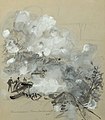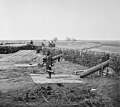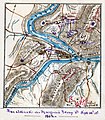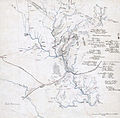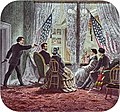Portal:American Civil War
 |
 |
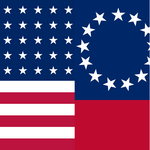
The American Civil War (1861–1865) was a sectional rebellion against the United States of America by the Confederate States, formed of eleven southern states' governments which moved to secede from the Union after the 1860 election of Abraham Lincoln as President of the United States. The Union's victory was eventually achieved by leveraging advantages in population, manufacturing and logistics and through a strategic naval blockade denying the Confederacy access to the world's markets.
In many ways, the conflict's central issues – the enslavement of African Americans, the role of constitutional federal government, and the rights of states – are still not completely resolved. Not surprisingly, the Confederate army's surrender at Appomattox on April 9,1865 did little to change many Americans' attitudes toward the potential powers of central government. The passage of the Thirteenth, Fourteenth and Fifteenth amendments to the Constitution in the years immediately following the war did not change the racial prejudice prevalent among Americans of the day; and the process of Reconstruction did not heal the deeply personal wounds inflicted by four brutal years of war and more than 970,000 casualties – 3 percent of the population, including approximately 560,000 deaths. As a result, controversies affected by the war's unresolved social, political, economic and racial tensions continue to shape contemporary American thought. The causes of the war, the reasons for the outcome, and even the name of the war itself are subjects of much discussion even today. (Full article)

The Confederate States of America financed its war effort during the American Civil War through various means, fiscal and monetary. As the war lasted for nearly the entire existence of the Confederacy, military considerations dominated national finance.
Early in the war the Confederacy relied mostly on tariffs on imports and on taxes on exports to raise revenues. However, with the imposition of a voluntary self-embargo in 1861 (intended to "starve" Europe of cotton and force diplomatic recognition of the Confederacy), as well as the blockade of Southern ports, declared in April 1861 and enforced by the Union Navy, the revenue from taxes on international trade declined. Likewise, the financing obtained through early voluntary donations of coins and bullion from private individuals in support of the Confederate cause, which early on proved quite substantial, dried up by the end of 1861. As a result, the Confederate government had to resort to other means of financing its military operations. A "war-tax" was enacted but proved difficult to collect. Likewise, the appropriation of Union property in the South and the forced repudiation of debts owed by Southerners to Northerners failed to raise substantial revenue. The subsequent issuance of government debt and substantial printing of the Confederate dollars contributed to high inflation, which plagued the Confederacy until the end of the war. Military setbacks in the field also played a role by causing loss of confidence and by fueling inflationary expectations. (Full article...)

Michigan made a substantial contribution to the Union during the American Civil War. While the state itself was far removed from the combat theaters of the war, Michigan supplied many troops and several generals, including George Armstrong Custer. When, at the beginning of the war, Michigan was asked to supply no more than one regiment, Governor Austin Blair sent seven. (Full article...)
John Milton Hay (October 8, 1838 – July 1, 1905) was an American statesman and official whose career in government stretched over almost half a century. Beginning as a private secretary and an assistant for Abraham Lincoln, he became a diplomat. He served as United States Secretary of State under Presidents William McKinley and Theodore Roosevelt. Hay was also a biographer of Lincoln, and wrote poetry and other literature throughout his life.
Born in Salem, Indiana to an anti-slavery family that moved to Warsaw, Illinois, Hay showed great potential from an early age, and his family sent him to Brown University. After graduation in 1858, Hay read law in his uncle's office in Springfield, Illinois, adjacent to that of Lincoln. Hay worked for Lincoln's successful presidential campaign and became one of his private secretaries in the White House. Throughout the American Civil War, Hay was close to Lincoln and stood by his deathbed after the President was shot. In addition to his other literary works, Hay co-authored, with John George Nicolay, a ten-volume biography of Lincoln that helped shape the assassinated president's historical image. (Full article...)
- ... that in the aftermath of the American Civil War, the only Black-led organization providing teachers to formerly enslaved people was the African Civilization Society?
- ... that Emma Dean Powell received a pass from General Ulysses S. Grant to accompany her husband to battlefield camps during the American Civil War after he lost his arm?
- ... that actor George Kunkel portrayed in blackface the character of Uncle Tom, using it at first to promote slavery during the American Civil War but later to attack it, after his views had changed?
- ... that The Land We Love, a little magazine that merged into Southern Magazine, printed American Civil War recollections, poetry, agricultural material, and many works by female authors?
- ... that some historians believe that Steele's Greenville expedition marked a shift in the Union's war policy?
- ... that at the Battle of La Haye-du-Puits in July 1944, a Confederate flag dating to the American Civil War was raised over the town?
- Attention needed
- ...to referencing and citation • ...to coverage and accuracy • ...to structure • ...to grammar • ...to supporting materials
- Popular pages
- Full list
- Cleanup needed
- The West Tennessee Raids
- Requested articles
- James Ashby (soldier) • Benjamin D. Fearing • James B. Speers • Charles S. Steedman • Battle of Barton's Station • Lawrence P. Graham • Frederick S. Sturmbaugh • Davis Tillson • Action at Nineveh (currently a redirect) • International response to the American Civil War • Spain and the American Civil War • Savannah Campaign Confederate order of battle • Native Americans in the American Civil War (currently disambiguation after deletion) • Battle of Lafayette • Battle of Sunshine Church • Requested American Civil War Medal of Honor recipients
- Expansion needed
- Battle of Boonsborough • Battle of Guard Hill • Battle of Rice's Station • Battle of Simmon's Bluff • Battle of Summit Point • Charleston Arsenal • Edenton Bell Battery • First Battle of Dalton • Blackshear Prison • Edwin Forbes • Hiram B. Granbury • Henry Thomas Harrison • Louis Hébert (colonel) • Benjamin G. Humphreys • Maynard Carbine • Hezekiah G. Spruill • Smith carbine • Edward C. Walthall • Confederate States Secretary of the Navy • Confederate States Secretary of the Treasury • David Henry Williams • Battle of Rome Cross Roads • Delaware in the American Civil War • Ironclad Board • United States Military Railroad • Kansas in the American Civil War • Rufus Daggett • Ebenezer Magoffin • Confederate Quartermaster-General's Department • First Corps, Army of Northern Virginia • Francis Laurens Vinton • Henry Maury • Smith's Expedition to Tupelo • Other American Civil War battle stubs • Other American Civil War stubs
- Images needed
- Battle of Lone Jack • Preston Pond, Jr. • Melancthon Smith
- Merging needed
- 1st Regiment New York Mounted Rifles and 7th Regiment New York Volunteer Cavalry
- Citations needed
- 1st Alabama Cavalry Regiment (Union) • 4th Maine Battery • 33rd Ohio Infantry • 110th New York Volunteer Infantry • Battle of Hatcher's Run • Camp Dennison • Confederate colonies • CSS Resolute • Dakota War of 1862 • Florida in the American Civil War • Ethan A. Hitchcock (general) • Fort Harker (Alabama) • Gettysburg (1993 film) • Iowa in the American Civil War • Second Battle of Fort Sumter • Samuel Benton
- Translation needed
- Add an article here!
The following Wikimedia Foundation sister projects provide more on this subject:
-
Commons
Free media repository -
Wikibooks
Free textbooks and manuals -
Wikidata
Free knowledge base -
Wikinews
Free-content news -
Wikiquote
Collection of quotations -
Wikisource
Free-content library -
Wikiversity
Free learning tools -
Wikivoyage
Free travel guide -
Wiktionary
Dictionary and thesaurus
- Shortcuts to this page: Portal:ACW • P:ACW





